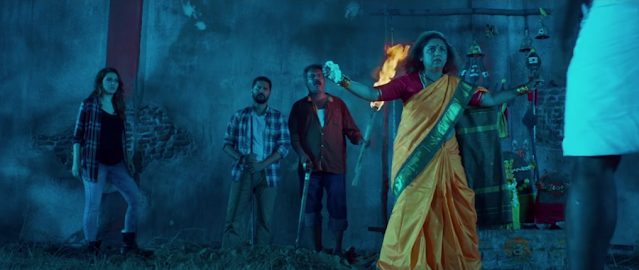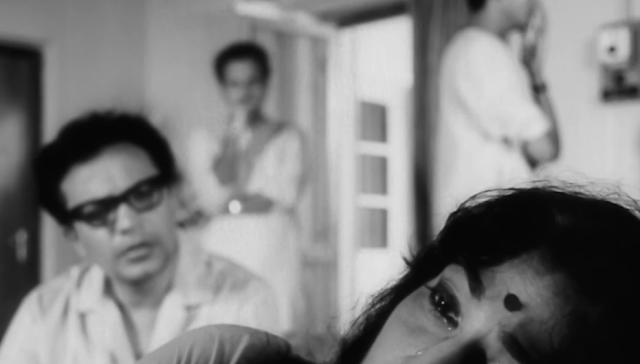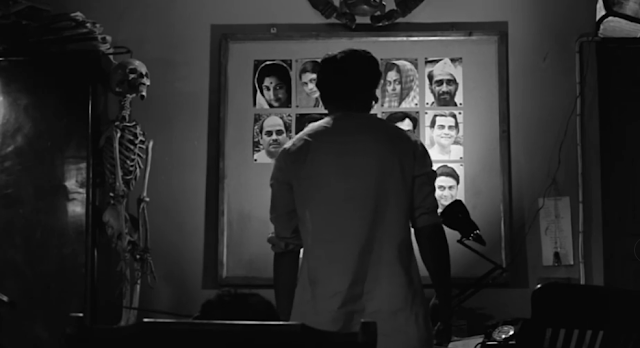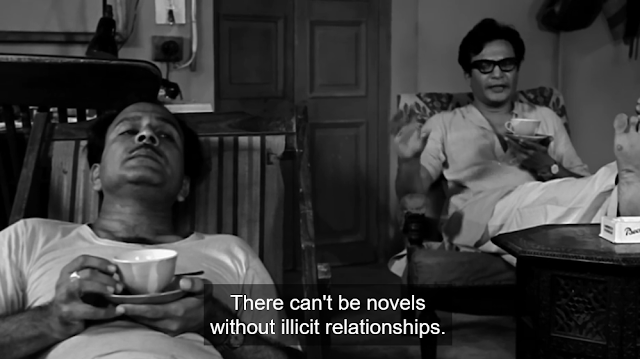Gulaebaghavali (2018) is a farce in which a charming gang of misfits compete with vicious criminals to retrieve a fortune in diamonds. That's a surprisingly common synopsis in Indian cinema, practically a subgenre, and they always seem to end the same way, with a desperate but silly struggle between competing factions for the diamonds. Still, there's always room for a twist.
This time, the fortune in diamonds is buried under a tree just outside of a temple in the village of Gulaebaghavali. Corrupt businessman Sampath (Madhusudhan Rao) wants it; it was buried by his grandfather, who had stolen them from a shady foreigner during the British occupation of India. The village is full of superstitious and well-armed locals, though, so to retrieve the diamonds Sampath is going to need help. Expendable help.
Munish (Ramdoss) is an easy recruit; he works for Sampath's gangster brother-in-law (Anandraj), so he only has to be told what to do. Badri (Prabhu Deva) is a little more complicated; he's a swashbuckling thief and statue smuggler who stumbles across Munish and company during their initial attempt to retrieve the diamonds. Badri is stealing a statue at the time, but has to take a break in order to rescue a damsel in distress, accidentally foiling Munish's plans in the process. Sampath's men capture Badri and confiscate his statues, but he's offered a great deal of money just to retrieve the chest. (They do not bother to explain what is in the box.)
And then there's the damsel. Viji (Hansika Motwani) is an attractive young woman whom Badri met at a nightclub and utterly failed to make an impression on. After her driver makes a crude pass, Viji gets out of the car and starts walking down the creepy Indian rural road, accidentally stumbling across a local performing a naked ritual. She's captured by the villagers, who now want her to perform the ritual, but she escapes when Badri makes his clumsy rescue attempt. Then she is promptly captured by Sampath's men.
The plan is for Viji to return to the village and perform the ritual, distracting the locals long enough for Badri and Munish to retrieve the box. However, while driving to the village Munish crashes the car into a lamp post, then loudly starts talking about a confrontation with the police. The trio leave the scene of the accident, and Munish explains that the car is bugged, and he is under orders to kill Badri and Munish once the box has been retrieved. He doesn't want to do that, though, and suggests that instead they split the contents three ways.
Munish tries to hijack another car, but the car that he selects happens to be driven by middle-aged con artist Maasha (Revathi), who quickly proves her worth by rescuing the group from Badri's old associates (Yogi Babu and Mansoor Ali Khan.) The bad news is that the group are down to a four-way split, but the good news is that Maasha is easily the most competent person in the entire movie. And she has more than one car. And a house they can stay at.
Even with Maasha's help, though, they have a tough job ahead of them, as they are forced to evade angry villagers, three separate criminal gangs, and Police Inspector Mayilvaganam (Sathyan), who happens to have been conned by each of the quartet at one time or another.
Badri is clearly supposed to be the hero here, and he certainly has all the qualities; he's brave, clever, and an excellent fighter, and his cynicism and greed masks the obligatory heart of gold. But Maasha steals every scene that she's in, and eventually runs off with the entire movie, along with a few shiny things she noticed along the way. She's even cleverer, enormously charming, and her greed and reflexive lying mask a heart of - well, it might be gold plated. That's the twist. Popular Indian cinema is often driven by testosterone, so it's a treat to see a woman run away with the movie like this.






























